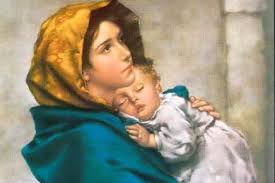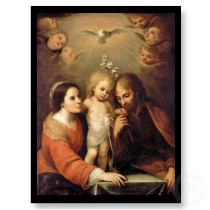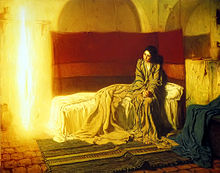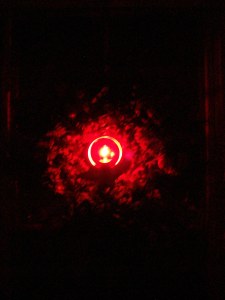When my children were small, they would say something at some point on Christmas day that I recall saying each Christmas when I was a little child myself; I wish it was Christmas every day…of course, at the time, my motivation was a little different, thinking of presents and lights and Christmas dinner….and I remember my parents telling me that if it was Christmas every day, then Christmas wouldn’t be special…that if it was an every day thing, it would become boring and routine….
In the mid 1990’s I served a peacekeeping mission in Bosnia, in the former Yugoslavia, and was away from my family for six months. My wife Kathi shared with me, how for several weeks after my departure, whenever she would ask one of our children to help set the table for a meal, they always set one place too many…a place for me, as if I was still there. They got used to this difference over time though, and when I returned, for several weeks after, whenever one of them was asked to set the table, they set one place too few. The routine had become ordinary for them; unless we reminded them of my absence or return in an extraordinary way by telling them directly how many places to set, they continued with the new routine. I think we have all had experiences where we are so used to having things done a certain way, a routine, or having certain people around us, that we don’t quite appreciate them as much as we should perhaps, until they are no longer present to us. Having family return for visits, particularly at this time of year, reminds us of how much we enjoy their company and miss that company when they return to their own homes or schools or jobs.
Sometimes we need the extraordinary event to remind us of the wonderful things we have in our ordinary lives. So it is too during the time of Advent leading up to Christmas. Over the last four weeks we have heard passages of sacred scripture talking about the ‘old routine’ of humanity, of the chosen people, of Israel waiting for the Messiah – with terms like ‘stay awake’ or ‘living in darkness’ as if the ‘old routine’ was one of disconnect or ignorance of God…
Today we hear from the Gospel of St. John, the words of the gospel’s prologue; In the beginning was the Word, and the Word was with God, and the Word was God All things came into being through Him, and without Him not one thing came into being’
Here we have God with us through all of our short history, and despite speaking directly through His prophets and His inspired Word, His chosen people – all of humanity really, got so used to Him being in the background, that they completely forgot about Him….that He was always present to them…….and so in the fullness of time, God directly intervenes again in human history, and is born among us, in the person of Jesus, as a baby in a manger at Bethlehem over 2000 years ago, or as this Gospel says,
“And the Word became flesh and lived among us, and we have seen His glory”
An extraordinary event to be sure…..but then aside from the shepherds that the angels announced the birth to in St. Luke’s Gospel, or the wise men who followed the star in St. Matthew’s Gospel, the birth of this child seems to have been largely ignored by everyone else…in their midst, a very ordinary event, and everyone in Palestine went about their day-to-day business.
The fact that the gospels tell us nothing of Jesus childhood and young adulthood, points to the ordinary-ness of His early life on earth – He lived in a home, with his family, learned his step-father’s trade, was obedient to his parents, made a living…His presence in the ordinary that would not be noticed unless people looked more closely at this child from Nazareth. In much the same way, we too, can go about our lives, our ordinary day-to-day existence without seeing Christ’s presence among us, unless we take the time to look more closely for Him in the events and people that surround us.
Why should we want to? Well, it speaks again to our understanding that from the very moment of our existence, our souls instinctively know that we are drawn to God, to the good, and that we can never be completely or truly happy until we are reunited with Him; and that was the whole reason for Christ being born among us as one of us; that in the person of Jesus, the Son, God was not content to sit in the background and wait for us to accomplish something we could never accomplish on our own; to return to union with Him; the Word who waited from the beginning, would no longer wait, but was born as one of us; into our ordinary existence in an extraordinary way.
We have spent weeks preparing for this day in a number of ways, as various and unique as people gathered here. For some it has been hectic, stressful – for others, a chance to consider faith and family – for still others a time to reflect over past joys or sorrows; yet in all these, the idea of preparing for the coming of the Lord, for Christmas, has been a part of our ‘routine’ now both in the sacred and secular worlds.
It is important for us, though, to remember that the acceptance of Christ coming among us as one of us, is not the end of a journey, or the culmination of all this preparation; really, it is a new beginning – a chance to renew our acquaintance with God in our midst in the person of Jesus Christ; a chance for a daily fresh start in the company and presence of this child of Bethlehem; today could be a start for some, a renewal for others; of considering our prayer lives, of receiving Christ in the Sacraments; of participating in the life of the Church. In January we will begin a program called Catholics Returning Home, and there will be further details of that in the bulletin.
We can either let Christ fade again into the background, as humans have done for centuries, or we can all use today as another start to bring Christ back into the foreground in our lives; to not let the fact that ‘the Word became flesh and lived among us and we have seen His glory,” become something we take for granted to the point of ignoring it, but something we celebrate and rejoice in and look to as a tremendous gift and source of joy that is given to each of us from God. It was St. Iranaeus who said; “The Word of God, Jesus Christ, because of His great love for us, became what we are, so that we may become what He is.” And just what is that? That is becoming a child of God, completely united with Him in all things, entering into His glory.
And as children, when we say I wish it was Christmas every day; when we seek and find Christ our Lord each day in our own homes, or relationships, or workplaces or schools, then we really have kept Christmas alive every day throughout the year. It is on this wonderful feast that we recall that extraordinary entry of God into our humanity – that we look to this extraordinary event to remind us that He is ever present with us, in our ordinary lives; that this extraordinary event becomes our ‘new’ ‘routine’. And it is in this new routine, that we will not forget to include Him, that we will remember to set a place for Him at the table of our hearts.
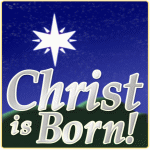
Praised be Jesus Christ, now and forever!

